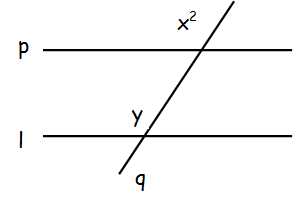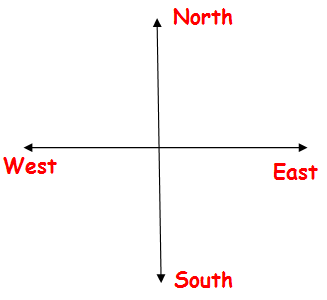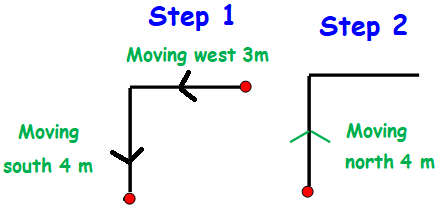PSAT MATH PRACTICE QUIZ
Question 1 :
Evaluate [(1/2)-(3/4)] ÷ (1/2) =
(A) 1/2 (B) 3/2 (C) -1/2 (D) -3/4 (E) 1
Solution :
= [(1/2)-(3/4)] ÷ (1/2)
= [(2 - 3)/4] ÷ (1/2)
= (-1/4) ÷ (1/2)
= (-1/4) ⋅ (2/1)
= -1/2
Hence the answer is -1/2.
Question 2 :

Line q intersects the parallel lines p and l. What is y3/3 ?
(A) x4/3 (B) x6 (C) x9 (D) x4/9 (E) x6/3
Solution :
The lines p and l are parallel lines and q is a transversal. So, corresponding angle are equal.
y = x2
y3/3 = (x2)3/3
= x6/3
Hence the value y3/3 is x6/3.
Question 3 :
Given the arithmetic sequence x, y, 30, z, f then find x + y + z + f.
(A) 60 (B) 80 (C) 120 (D) 130 (E) 140
Solution :
In a arithmetic sequence, the common difference is d. Each consecutive terms differs by d. The values of x,y, z and f in terms of the difference d, is
x = 30 - 2d
y = 30 - d
z = 30 + d
f = 30 + 2d
x + y + z + f = 30 - 2f + 30 - d + 30 + d + 30 + 2d
= 120
Hence the answer is 120.
Question 4 :
If (-1)2 = 1, then the value (-1) 2023 is
(A) -2023 (B) -1 (C) 0 (D) 1 (E) 2023
Solution :
(-1) 2023 = (-1)2022 ⋅ (-1)
= ((-1)2)1011 ⋅ (-1)
= 11011 ⋅ (-1)
= 11011 ⋅ (-1) = -1
Hence the answer is -1.
Question 5 :
Caroline has two times as many marbles as Jake. Jake has 12 less than 7 times as many marbles James has. James has 14 marbles. How many marbles dies Caroline have ?
(A) 52 (B) 54 (C) 86 (D) 98 (E) 172
Solution :
Number of marbles with James = 14
Number of marbles with Jake = 7(14) - 12
= 98 - 12
= 86
Number of marbles with Caroline = 2 (86)
= 172
Hence Caroline has 172 marbles.
Question 6 :
John is trying to escape a ditch. Every time he jumps 10 meters, he falls back 5 meters right after. The ditch is 19 meters long. What is the minimum number of jumps he needs to make to escape ?
(A) (B) 4 (C) 5 (D) 7 (E) 8
Solution :
At the first jump, he reaches 10 meters, but he falls back 5 meters. Now, John crossed 5 m.
At the second jump, he reaches from 5 m to 15 m, but he falls back 5 m. So, he will be at 10 m.
At the third jump, he reaches from 10 m to 20 m, but he falls back 5 m. So, he will be at 15 m
At the fourth jump, he reaches from 15 m to 25 m, but he falls back 5 m. So, he will be at 20 m
So, 4 jumps are required to escape a ditch of length 19 m.
Question 7 :
What is the largest number of digits the product of 3 digit and 2 digit number has ?
(A) 4 digit (B) 5 digit (C) 6 digit
(D) 7 digit (E) 8 digit
Solution :
The product of 3 digit and 2 digit number will be 4 digit or 5 digit number.
Since we need the largest number of digits, the answer is 5 digits.
Question 8 :
If Fn = 2 Fn-1 + 3 Fn-2, then what is F3 if F1 = F2 = 1 ?
(A) 2 (B) 3 (C) 4 (D) 5 (E) 10
Solution :
n = 3
F3 = 2 F3-1 + 3 F3-2
F3 = 2 F2 + 3 F1
F3 = 2 (1) + 3 (1)
F3 = 2 + 3 = 5
Question 9 :
Sam walks 3 m to the west, then 4m south, then 4 m North. How far is he from his original location?
(A) 3 m (B) 5 m (C) 7 m (D) 8 m (E) 12 m
Solution :


So he will be at 3 m distance from the starting point.
Question 10 :
If a = 3 and b = 5, what is the value of 9a/(b-a) ?
(A) 9 (B) 27 (C) 13/5 (D) 27/2 (E) 26/5
Solution :
9a / (b - a) = 9(3)/(5-3)
= 27/2
Hence the answer is 27/2.
Kindly mail your feedback to v4formath@gmail.com
We always appreciate your feedback.
©All rights reserved. onlinemath4all.com
Recent Articles
-
Digital SAT Math Problems and Solutions (Part - 150)
Apr 25, 25 11:46 AM
Digital SAT Math Problems and Solutions (Part - 150) -
AP Calculus AB Problems with Solutions (Part - 19)
Apr 24, 25 11:10 PM
AP Calculus AB Problems with Solutions (Part - 19) -
AP Calculus AB Problems with Solutions (Part - 18)
Apr 24, 25 11:06 PM
AP Calculus AB Problems with Solutions (Part - 18)
